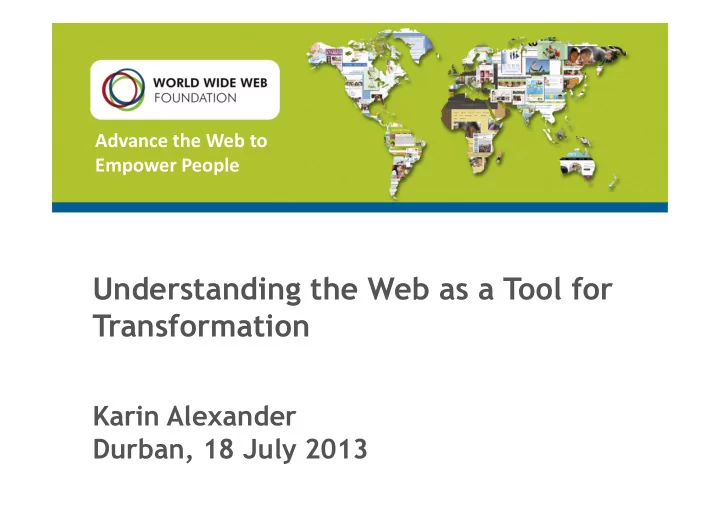

Advance the Web to Empower People Understanding the Web as a Tool for Transformation Karin Alexander Durban, 18 July 2013
About the Web Foundation � Seeks to establish the open Web as a global public good and a basic right � Works in two main pillars: Open Web and Open Democracy � Noteworthy current/recent projects: � Partnering with UN on global MyWorld survey, using voice-based web technology in one or the world’s largest ever-surveys � Leading first-ever in-depth study into Open Data in Developing Countries Informing debates on major Web freedom issues: Prism, Marco Civil � � Alliance for Affordable Internet 2
Why Create an Index? 3
Why Create an Index? � The Web has undoubtedly had a profound impact on humanity � YET - the nature and extent of the Web’s impact is relatively poorly understood � In order for the Web to attain its full potential as a transformative tool that could improve living standards, reduce conflict and improve governance and well-being, it is important to understand how the Web impacts social, developmental, economic and political dimensions. 4
About the Web Index 5
About the Web Index � Launched 2012, 2013 research underway � The Index measures how the Web empowers people through free and open access to platforms where they connect, communicate and innovate � A powerful analytical tool that produces evidence which can highlight areas of weakness and improvement in national IT strategies and thinking � In 2012: 61 Countries � 2013 edition: 80 countries, 75 primary indicators, expanded and enhanced data set (particularly in the areas of gender, Open Data, surveillance and security) 6
Basic Structure Sub-Index 3 Political (P), Economic (E) and Social (S)/developmental impact Overall scores scores Web Index Sub-Index 2: Content score score Sub-Index 1: Connectivity infrastructure score 7 7
A closer look… Social & Political impact score : Economic developmental e,.g. Participation, impact score : impact score : electoral politics, e.g. Macro- e.g. Education, transparency, effects, health, innovation, accountability, access commerce, socialisation (blogs, Web Index: to gov. data, legal and Industry, access to, Overall score human rights issues, Agriculture, generation & (the overall govt. use of the Web financial consumption of value of the as a tool for services, etc. social websites), Web to repression, etc. etc. people, or the overall impact of the Content score : Web on e.g. Locally generated pages, content type, local language pages, people & censorship, standards, skill levels required for access, communities) accessibilty, cybercrime, content policy, privacy policy, etc. Infrastructure score : e.g. Computers per 100, mobiles per 100, broadband & speed, cost, policies, regulations, regional domain registries, etc. 8 8
What were the 2012 results? 9
2012 Results 10
2012 Results 11
2012 Results 12
2012 Results 13
Measuring impact, creating impact 14
Using the data • The Index is a powerful analytical tool to inform the decision-making process of various stakeholders, allowing for better-informed decisions and more targeted interventions and strategies. • Allows policy interventions to be formulated and targeted more directly to improve specific indicators. 15
Governments • The Web Index enables national policymakers to assess and track their performance in comparison with other countries, thereby targeting the specific indicators that allow other countries to rank higher. 16
Multi-lateral organisations/donors • Empowers multilateral organisations to identify investment areas more efficiently and design program interventions to deliver benefits more effectively. 17
Businesses • Also an important analytical tool for corporations and private businesses looking to harness the Web’s potential. • Companies can analyse indicators in the Index relevant to their field, and target countries where they see demand and the necessary infrastructure for delivery. 18
NGOs and advocacy groups • NGOs use the Index and its rankings in their discussions with policymakers to make a stronger case for government support for a particular project in that field. • Also used to assess progress and hold stakeholders to account. 19
Continuous improvement… 20
Questions • Engaging with: • Governments • CSOs • Businesses • Suggestions for future research areas? 21
Contact Details Karin Alexander Web Index Manager karin@webfoundation.org +27 72 208 9794 (ZA) Skype: karinjanealexander www.thewebindex.org 22
Recommend
More recommend